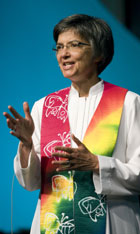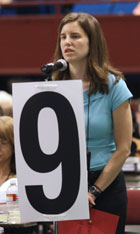United Methodists must live with a spirit of abundance and not scarcity as they go into the world, the new president of the Council of Bishops told delegates on May 2, at the closing worship of the 2008 General Conference.
It is “incumbent on you and me as people of Christian faith that we not become stingy with the blessings — stingy with what we have received from God,” said Bishop Gregory Palmer in his sermon to close the denomination’s top legislative assembly. Palmer, who leads the church’s Iowa Area, was installed as president of the council on April 26.
“Naked we came into this world,” he said. “We brought nothing with us, and we will take nothing with us. Everything we have — every good and perfect gift, comes from God.
“I am more hopeful for the church tonight than I have ever been because I am more vulnerable than I have ever been, and I need to depend more on the Holy Ghost than I have ever depended on the Holy Ghost,” he said. “Lord except you help us by your spirit we haven’t a got a chance.”
Palmer’s sermon closed the April 23–May 2 assembly shortly before midnight.
A focused budget

Bishops Mary Ann Swenson and John Hopkins introduce the presentation on the church’s proposed budget. A UMNS photo by Maile Bradfield.
Earlier in the day, the delegates approved a $642 million denominational spending plan for the next four years built around four areas of focus for the immediate future:
- Developing principled Christian leaders;
- Creating new places for new people by starting new congregations and renewing existing ones;
- Engaging in ministries with the poor; and
- Improving global health, especially attacking the killer diseases of poverty.
The budget calls for a 1.2 percent increase over each of the four years from 2009 to 2012. Church finance leaders acknowledged this increase does not keep up with inflation projections but said it is sufficient.
Prior to the meeting in Fort Worth, the conference received 27 petitions asking for a total of nearly $50 million above the $642 million bottom line. That was pared down during General Conference to $3.7 million in unbudgeted items.
The General Council on Finance and Administration and the church’s Connectional Table worked with the general agencies to accommodate the unbudgeted requests, covering them through mostly reserve funds and some budget adjustments.
Those include $2 million to support theological education in Africa; $400,000 for the African-American Methodist Heritage Center; $600,000 to study structural issues related to the church’s increasingly global nature; $290,000 for the committee on central conference affairs; $300,000 for a new committee on faith and order; $115,000 for the church’s Judicial Council; and $50,000 for the Sand Creek Massacre site.
Morning worship

Bishop Hope Morgan Ward
preaches the morning sermon.
A UMNS photo by Paul Jeffrey.
The final day began with a sermon by Mississippi Area Bishop Hope Morgan Ward, who urged the 992 delegates to go home from General Conference focusing less on the decisions made and more on things learned.
“We learned much about God,” she said. “In this General Conference-ending day, we know that Christ is with us.”
Ward based her sermon on Acts 1:6-11, when Christ told His disciples to wait for the time when God restores His kingdom. It was not for them to know the time of His coming.
She acknowledged that many people, especially those at a meeting such as General Conference, have a difficult time waiting and not knowing. “This was an invitation to wait, to remember there are things we are not to know,” she said. “It was an invitation to receive the spirit, to be a witness.”
Ward shared how United Methodists affected by Hurricane Katrina in Mississippi and Louisiana were asked to bring shards of broken items to be part of a cross or handed out to delegates. A woman came to Heritage United Methodist Church in D’Iberville, Miss., with bent spoon. “Since the storm, I have kept this bent spoon,” said the woman. “For some reason, I have not been able to throw this spoon away. Until now. I’m ready to let it go; let it go to someone at the General Conference.”
Other actions

Delegate Tara Thronson
speaks on a social issues
petition. A UMNS photo by
Maile Bradfield.
Social issues consumed much of the closing hours of business.
The Board of Church and Society and the Women’s Division of the Board of Global Ministries will continue as members in the Religious Coalition for Reproductive Choice. General Conference affirmed by a vote of 416–384 its 35-year relationship with the interfaith association.
The assembly added a statement on abortion to the Social Principles with language offering “ministries to reduce unintended pregnancies” and to assist the ministry of crisis pregnancy and support centers that help women “find feasible alternatives to abortion.”
The assembly retained language defining marriage as a union between one man and one woman.
Pastors or district superintendents may now ask the bishop to give sacramental authority to a deacon if an elder is not present. That right is confined to the location of a deacon’s primary appointment.
In areas where it would take a great deal of time to deliver the sacraments to persons, a layperson is given the right to deliver the Communion elements.
The assembly affirmed the validity of scientific findings as ways to expand our understanding of the natural world and the mysteries of God’s creation and the Word.
Noting that Israel continues to violate international law by building a wall on Palestinian land, the conference called upon Israel and Palestine to uphold U.N. resolutions and International Court of Justice rulings.
The conference asked the denomination’s Board of Church and Society to identify and publish on its Web site educational resources on stem-cell research. The resolution encourages pastors to use the resources to become informed about the use of embryonic stem cells for medical research and to offer these resources for study in their local churches.
If annual conferences ratify the action by a two-thirds majority, the constitution will be amended to make it clear that all persons shall be eligible to attend worship services and, upon taking vows, become church members.
People who join United Methodist churches henceforth will promise to be faithful in “their witness” as well as in their prayers, presence, gifts and service. The conference also voted to add the witness phrase to the liturgy used by the church when a person makes a profession of membership.
During a press conference after a May 1 demonstration on the assembly floor over the church’s stance on homosexuality, Palmer said he had a “deep sense of gratitude” for both how the protest was handled and how delegates and bishops responded. Afterwards, 16 bishops met with witnesses advocating for full inclusion “We went into a time of discussion, speaking from our hearts as much as our heads,” said Bishop Sally Dyck.
Noting that more than 400 persons have been put to death in Texas since 1982, the assembly asked the Texas legislature to end executions.
The conference called on United Methodists to divest funds from companies that support the government of Sudan in order to end the genocide in that area.
The body encouraged the implementation of the universal school lunch program.
The assembly called for equal rights of men with regard to parental leave and child custody.
*Currently attending his 11th General Conference, Peck is a four-time editor of the Daily Christian Advocate now serving as an editor for United Methodist News Service during General Conference
News media contact: Tim Tanton e-mail :newsdesk@umcom.org.
Video
John Bishop: "It'll get our denomination off to a good start."
Related Articles
General Conference headlines
Resource
Like what you're reading? Support the ministry of UM News! Your support ensures the latest denominational news, dynamic stories and informative articles will continue to connect our global community. Make a tax-deductible donation at ResourceUMC.org/GiveUMCom.




